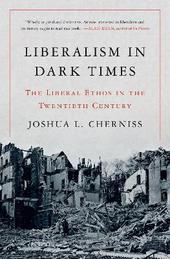
|
Liberalism in Dark Times: The Liberal Ethos in the Twentieth Century
Hardback
Main Details
| Title |
Liberalism in Dark Times: The Liberal Ethos in the Twentieth Century
|
| Authors and Contributors |
By (author) Joshua L. Cherniss
|
| Physical Properties |
| Format:Hardback | | Pages:328 | | Dimensions(mm): Height 235,Width 156 |
|
| Category/Genre | Social and political philosophy |
|---|
| ISBN/Barcode |
9780691217031
|
| Classifications | Dewey:320.51 |
|---|
| Audience | |
|---|
|
Publishing Details |
| Publisher |
Princeton University Press
|
| Imprint |
Princeton University Press
|
| Publication Date |
5 October 2021 |
| Publication Country |
United States
|
Description
A timely defense of liberalism that draws vital lessons from its greatest midcentury proponents. Today, liberalism faces threats from across the political spectrum. While right-wing populists and leftist purists righteously violate liberal norms, theorists of liberalism seem to have little to say. In Liberalism in Dark Times, Joshua Cherniss issues a rousing defense of the liberal tradition, drawing on a neglected strand of liberal thought. Assaults on liberalism - a political order characterised by limits on political power and respect for individual rights - are nothing new. Early in the twentieth century, democracy was under attack around the world, with one country after another succumbing to dictatorship. While many intellectuals dismissed liberalism as outdated, unrealistic, or unworthy, a handful of writers defended and reinvigorated the liberal ideal, including Max Weber, Raymond Aron, Albert Camus, Reinhold Niebuhr, and Isaiah Berlin - each of whom is given a compelling new assessment here. Building on the work of these thinkers, Cherniss urges us to imagine liberalism not as a set of policies but as a temperament or disposition - one marked by openness to complexity, willingness to acknowledge uncertainty, tolerance for difference, and resistance to ruthlessness. In the face of rising political fanaticism, he persuasively argues for the continuing importance of this liberal ethos.
Author Biography
Joshua L. Cherniss is associate professor of government at Georgetown University and the author of A Mind and Its Time: The Development of Isaiah Berlin's Political Thought. He lives in Washington, DC. Twitter @JoshuaCherniss
Reviews"A Foreign Affairs Best Book of the Year" "[A] stellar and timely contribution. . . . In Liberalism in Dark Times, Cherniss has done us a great service by pointing us toward the examples [Camus, Aron, Niebuhr, and Berlin] set in their times. In our own times, as we continue to wrestle with the liberal predicament, we would do well to follow their lead."---Daniel Stid, American Purpose "Cherniss . . . is to be commended for writing the first book-length study on the historical origins and ethical nature of Cold War liberalism."---Daniel Steinmetz-Jenkins, The Baffler "[A] fascinating book."---G. John Ikenberry, Foreign Affairs "In this terrifically rich, scholarly, and stimulating book, Cherniss seeks to recover a way of thinking about liberalism as a response to the problem of ruthlessness. . . . Liberalism in Dark Times is a vital book for those who are not willing to give up on [liberalism] quite yet."---Matt Sleat, Perspectives on Politics "Thoughtful and clearly presented." * Choice Reviews * "Liberalism in Dark Times is a historically sensitive presentation of what Cherniss reconstructs as a tempered liberalism within the interwar period, the Second World War and the Cold War as reservoirs for the political thinking of Aron, Berlin, Camus and Niebuhr. . . . the book is not only deep in its detailed readings of Weber, Lukacs, Camus, Aron, Niebuhr and Berlin, but also broad- and open-minded in the intellectual engagements with the variety of traditions and positions in contemporary political theory."---Anders Berg-Sorensen, Contemporary Political Theory "A persistent political temptation is to fight fire with fire-to defend liberalism by illiberal means, to become ruthlessly liberal. In Cherniss's hands, the liberal predicament becomes the challenge of sustaining the moral fortitude to refuse ruthlessness. . . . Ruthlessness corrodes the liberal ethos, eventually transforming us into our foes"---Robert B. Talisse, Review of Politics
|